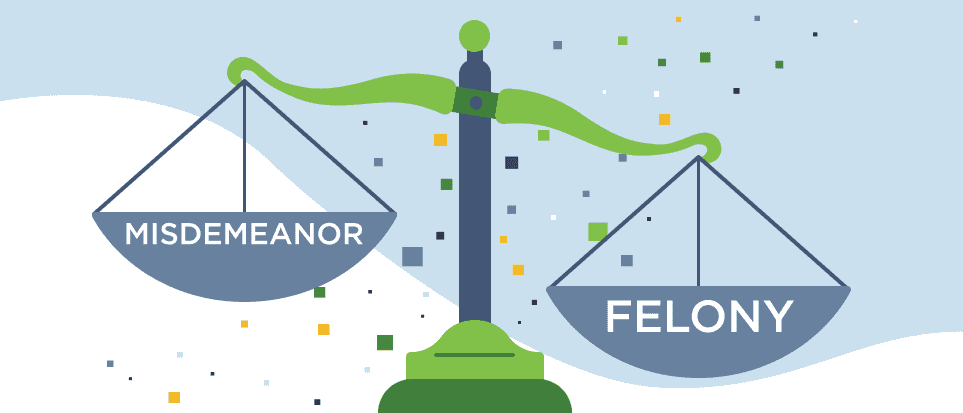When it comes to criminal law, understanding the distinction between misdemeanors and felonies is crucial. These categories reflect the severity of the crime, the potential punishments, and the long-term consequences a conviction can have on your life.
While misdemeanors are generally considered less serious offenses, felonies carry significantly harsher penalties and can permanently impact your civil rights, career prospects, and personal freedom.
Knowing the difference can help anyone facing charges, or even just navigating legal discussions, to better understand what’s at stake.
What Is a Misdemeanor?
A misdemeanor is a criminal offense that is serious enough to warrant punishment but is generally considered less severe than a felony. These crimes often involve minor property damage, non-serious bodily harm, or infractions against public order. Examples can include petty theft, minor assaults, trespassing, or first-time DUI offenses without injury.
As Mike Howard, Misdemeanor Attorney at Law Office of Mike Howard, says, “The defining characteristic of a misdemeanor is that the punishment is limited: typically less than one year in a local or county jail, fines, probation, and sometimes mandated community service or educational programs.”
While misdemeanors may seem “minor,” they still carry consequences. A misdemeanor conviction results in a criminal record, which can affect employment opportunities, housing applications, and professional licensing.
For instance, someone convicted of a misdemeanor theft may find it difficult to secure jobs in finance or customer-facing positions, even if the offense occurred years ago.
Additionally, for non-citizens, a misdemeanor could impact immigration status or future naturalization eligibility. Despite being less severe than felonies, misdemeanors are not something to take lightly.
What Is a Felony?
Felonies represent the most serious category of crime in the legal system. These offenses often involve violence, substantial financial loss, or crimes that pose a significant risk to society.
Examples include murder, rape, armed robbery, large-scale fraud, drug trafficking, and aggravated assault with a weapon. Felonies carry severe penalties, often including prison sentences longer than one year in state or federal facilities, substantial fines, and long-term restrictions on civil rights.
As Shaun Marks, Flint, Clarkston, MI DUI Lawyer at Shaun R. Marks, P.C, says, “The consequences of a felony extend far beyond incarceration. Individuals convicted of a felony may lose the right to vote, the right to own firearms, and the ability to serve on a jury. Employment opportunities are dramatically reduced, especially in fields that require security clearance or professional licensing, such as education, healthcare, or law.”
Even after serving time, felonies create lasting stigma and barriers, making it much harder to fully reintegrate into society compared to someone with a misdemeanor conviction.
How Misdemeanors and Felonies Differ
The key differences between misdemeanors and felonies are not just legal technicalities—they fundamentally affect how a person’s life is impacted after a conviction. Misdemeanors generally involve minor harm or property crimes, while felonies involve major harm, violence, or substantial financial loss.
Jonathan Sills, DUI Defense Attorney at The Sills Law Firm, LLC, says, “The locations where sentences are served also differ: misdemeanors are usually served in local jails, whereas felonies require prison time in state or federal facilities. Felonies carry longer sentences and harsher fines, as well as restrictions on civil and legal rights.”
Another difference is the long-term impact of each conviction. A misdemeanor may be eligible for expungement after a certain period, depending on the jurisdiction, allowing the individual to regain certain rights and improve employment prospects.
Felonies are much harder to expunge and often permanently affect career and life opportunities. Even when a felony conviction doesn’t result in prison, it can still lead to probation, parole, or mandatory rehabilitation programs that restrict personal freedom.
Wobbler Crimes: The Gray Area
Not all crimes fall neatly into misdemeanor or felony categories. Some offenses, known as “wobblers,” can be charged either way, depending on factors such as the severity of the incident, prior criminal history, and prosecutorial discretion. For example, assault with a weapon that does not cause major injury might be charged as a misdemeanor in one case and a felony in another. Similarly, theft cases can vary depending on the value of the stolen property or whether aggravating circumstances exist.
Hugh Burkson, securities fraud lawyer at McCarthy, Lebit, Crystal & Liffman Co., LPA, says, “This gray area underscores the importance of legal representation. A skilled attorney can often negotiate for a wobbler to be treated as a misdemeanor rather than a felony, significantly reducing potential penalties and long-term consequences.”
The classification of the crime can make the difference between a brief period of local incarceration and years in state prison with lasting collateral consequences.
The Broader Impact of Criminal Classification
The distinction between misdemeanor and felony extends beyond the courtroom and sentencing. Both types of convictions can affect daily life, but felonies do so on a much more significant scale. Employment prospects are curtailed, with many employers refusing to hire individuals with felony records.
Housing can also become difficult to secure, as landlords often run background checks and may reject applicants with a felony history. Educational opportunities, including scholarships, student loans, and acceptance into certain programs, can also be restricted.
Civil rights are another major difference. Felony convictions often remove voting rights, the ability to own firearms, and eligibility to serve in government positions.
For non-citizens, felonies can trigger deportation proceedings or prevent naturalization. Even socially, felonies carry stigma that can affect relationships and reputation for years. While misdemeanors are not without consequence, the impact of felonies is far-reaching and often permanent.
What To Do If You’re Facing Charges
Being charged with a misdemeanor or felony can feel overwhelming, but there are steps you can take to protect yourself. First, it’s critical to remain calm and not make any statements or decisions in the heat of the moment. Engaging with law enforcement without an attorney can be risky, as even minor comments may be used against you. Second, seek legal representation immediately.
A qualified criminal defense attorney can advise you on your rights, explain potential outcomes, and develop a strategy to reduce charges or penalties.
Gathering evidence, documenting events, and identifying witnesses early can strengthen your defense. Following all court procedures carefully—including appearing for hearings, complying with bail conditions, and attending required meetings—can prevent additional complications or charges. For wobbler cases, an attorney may help negotiate a lower classification of the crime, turning a potential felony into a misdemeanor and dramatically altering the life impact of the conviction.
The Role of Intent and Circumstances in Classification
One of the most important factors that distinguishes misdemeanors from felonies is the intent of the offender and the specific circumstances of the crime. Courts don’t just look at what happened—they consider why it happened and how it happened.
For example, shoplifting a candy bar on a first-time offense might be charged as a misdemeanor, but the same act with premeditation, repeated offenses, or use of threats could escalate it to a felony.
Similarly, assault without serious injury is often a misdemeanor, but if it involves a weapon or results in serious bodily harm, it can become a felony.
Circumstances such as prior criminal history, the presence of aggravating factors, and the degree of harm caused all influence whether a crime is treated as a misdemeanor or a felony.
Understanding these nuances is critical because they affect not only the charges filed but also the potential penalties and long-term consequences.
A minor difference in intent or context can mean the difference between a brief jail sentence and years in prison, making it essential to work with an attorney who can analyze the facts and advocate effectively on your behalf.
Final Thoughts
Understanding the difference between misdemeanors and felonies is about more than legal definitions; it’s about grasping the full scope of consequences that come with a criminal charge. Misdemeanors may appear minor, but they can affect employment, housing, and personal records. Felonies carry life-altering consequences, including long prison terms, loss of rights, and social stigma. Being informed, exercising your rights, and securing effective legal counsel are critical steps to navigating any criminal charge.






